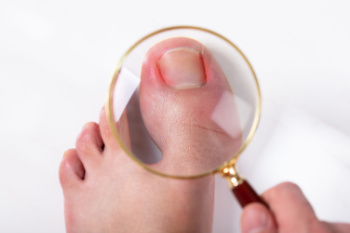
Plantar fasciitis is a common foot condition characterized by inflammation of the plantar fascia, a thick band of tissue that runs along the bottom of the foot, connecting the heel bone to the toes. This condition typically manifests as heel pain, particularly with the first steps in the morning or after periods of rest, which can gradually worsen throughout the day. The precise cause of plantar fasciitis is not always clear, but it often results from repetitive strain or excessive stress on the plantar fascia. Factors contributing to the development of plantar fasciitis include overuse from activities such as running, walking long distances, or standing for extended periods. Additionally, certain risk factors like obesity, high arches, flat feet, or tight calf muscles can increase the likelihood of developing plantar fasciitis. If you have heel pain, it is suggested that you visit a podiatrist who can effectively diagnose plantar fasciitis, and offer an appropriate treatment plan.
Plantar fasciitis can be very painful and inconvenient. If you are experiencing heel pain or symptoms of plantar fasciitis, contact one of our podiatrists from Accent Podiatry Associates. Our doctors can provide the care you need to keep you pain-free and on your feet.
What Is Plantar Fasciitis?
Plantar fasciitis is the inflammation of the thick band of tissue that runs along the bottom of your foot, known as the plantar fascia, and causes mild to severe heel pain.
What Causes Plantar Fasciitis?
- Excessive running
- Non-supportive shoes
- Overpronation
- Repeated stretching and tearing of the plantar fascia
How Can It Be Treated?
- Conservative measures – anti-inflammatories, ice packs, stretching exercises, physical therapy, orthotic devices
- Shockwave therapy – sound waves are sent to the affected area to facilitate healing and are usually used for chronic cases of plantar fasciitis
- Surgery – usually only used as a last resort when all else fails. The plantar fascia can be surgically detached from the heel
While very treatable, plantar fasciitis is definitely not something that should be ignored. Especially in severe cases, speaking to your doctor right away is highly recommended to avoid complications and severe heel pain. Your podiatrist can work with you to provide the appropriate treatment options tailored to your condition.
If you have any questions please feel free to contact our offices located in Arlington and Mansfield, TX . We offer the newest diagnostic and treatment technologies for all your foot and ankle needs.

An ingrown toenail, a common foot condition, occurs when the edge of the toenail grows into the surrounding skin, leading to pain, swelling, and discomfort. This condition typically affects the big toe but can occur on any toe. Ingrown toenails can develop due to a variety of factors, including improper nail trimming techniques, wearing tight-fitting shoes, or sustaining toe injuries. Additionally, individuals with curved or unusually shaped toenails may be more prone to ingrown toenails. Symptoms of ingrown toenails include redness, tenderness, and inflammation around the affected nail, as well as the presence of pus or drainage in severe cases. If left untreated, ingrown toenails can become infected, causing further pain and complications. Recognizing the causes and symptoms of ingrown toenails is important for prompt treatment and prevention strategies. If you have developed an ingrown toenail, it is suggested that you contact a podiatrist who can treat this condition, which may include minor surgery for partial or total removal.
Ingrown toenails may initially present themselves as a minor discomfort, but they may progress into an infection in the skin without proper treatment. For more information about ingrown toenails, contact one of our podiatrists of Accent Podiatry Associates. Our doctors can provide the care you need to keep you pain-free and on your feet.
Ingrown Toenails
Ingrown toenails are caused when the corner or side of a toenail grows into the soft flesh surrounding it. They often result in redness, swelling, pain, and in some cases, infection. This condition typically affects the big toe and may recur if it is not treated properly.
Causes
- Improper toenail trimming
- Genetics
- Improper shoe fitting
- Injury from pedicures or nail picking
- Abnormal gait
- Poor hygiene
You are more likely to develop an ingrown toenail if you are obese, have diabetes, arthritis, or have any fungal infection in your nails. Additionally, people who have foot or toe deformities are at a higher risk of developing an ingrown toenail.
Symptoms
Some symptoms of ingrown toenails are redness, swelling, and pain. In rare cases, there may be a yellowish drainage coming from the nail.
Treatment
Ignoring an ingrown toenail can have serious complications. Infections of the nail border can progress to a deeper soft-tissue infection, which can then turn into a bone infection. You should always speak with your podiatrist if you suspect you have an ingrown toenail, especially if you have diabetes or poor circulation.
If you have any questions, please feel free to contact our offices located in Arlington and Mansfield, TX . We offer the newest diagnostic and treatment technologies for all your foot care needs.

Pregnancy is marked by numerous changes in the body, including the feet. One notable alteration is the increase in shoe size experienced by many expectant mothers. This change occurs due to hormonal fluctuations and the body's natural tendency to retain fluids, which leads to swelling in the feet and ankles. Consequently, women may find that their usual shoe size feels snug or uncomfortable during pregnancy, necessitating the need for larger footwear to accommodate the swelling. Additionally, some pregnant individuals may encounter itching and redness on the soles of their feet, a condition known as pruritus gravidarum. This symptom can arise due to heightened blood circulation, hormonal changes, or skin stretching, causing discomfort and irritation. While these foot changes are a normal part of pregnancy, expectant mothers need to prioritize foot health by wearing supportive footwear, practicing gentle foot exercises, and elevating the feet to reduce swelling. Consulting with a podiatrist can also guide in managing foot discomfort and ensuring a smooth pregnancy journey. If you are seeking relief from foot conditions developed during pregnancy, it is suggested that you consult a podiatrist.
Pregnant women with swollen feet can be treated with a variety of different methods that are readily available. For more information about other cures for swollen feet during pregnancy, consult with one of our podiatrists from Accent Podiatry Associates. Our doctors will attend to all of your foot and ankle needs.
What Foot Problems Can Arise During Pregnancy?
One problem that can occur is overpronation, which occurs when the arch of the foot flattens and tends to roll inward. This can cause pain and discomfort in your heels while you’re walking or even just standing up, trying to support your baby.
Another problem is edema, or swelling in the extremities. This often affects the feet during pregnancy but tends to occur in the later stages.
How Can I Keep My Feet Healthy During Pregnancy?
- Wearing orthotics can provide extra support for the feet and help distribute weight evenly
- Minimize the amount of time spent walking barefoot
- Wear shoes with good arch support
- Wear shoes that allow for good circulation to the feet
- Elevate feet if you experience swelling
- Massage your feet
- Get regular, light exercise, such as walking, to promote blood circulation to the feet
If you have any questions please feel free to contact our offices located in Arlington and Mansfield, TX . We offer the newest diagnostic and treatment technologies for all your foot and ankle needs.
Blog Archives
- December 2023
- November 2023
- October 2023
- September 2023
- August 2023
- July 2023
- June 2023
- May 2023
- April 2023
- March 2023
- February 2023
- January 2023
- December 2022
- November 2022
- October 2022
- September 2022
- August 2022
- July 2022
- June 2022
- May 2022
- April 2022
- March 2022
- February 2022
- January 2022
- December 2021
- November 2021
- October 2021
- September 2021
- August 2021
- July 2021
- June 2021
- May 2021
- April 2021
- March 2021
- February 2021
- January 2021
- December 2020
- November 2020
- October 2020
- September 2020
- August 2020
- July 2020
- June 2020
- May 2020
- April 2020
- March 2020
- February 2020
- January 2020
- December 2019
- November 2019
- October 2019
- September 2019
- August 2019
- July 2019
- June 2019
- May 2019
- April 2019
- March 2019
- February 2019
- January 2019





